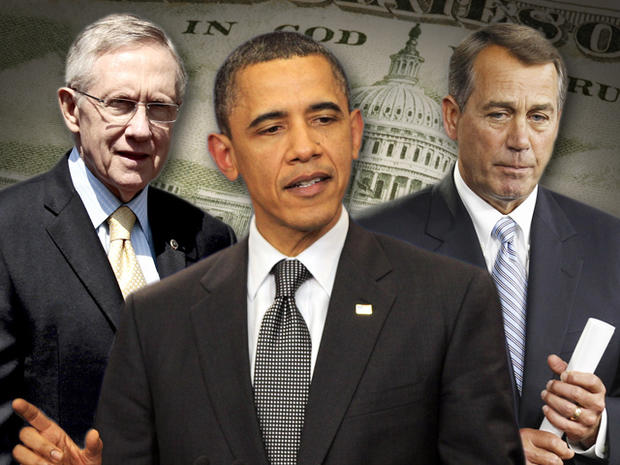Congress passes spending bill averting shutdown
Updated 6:29 p.m. Eastern Time
The House and Senate on Thursday passed a spending bill to fund the federal government for the remaining six months of the fiscal year, agreeing to the compromise plan worked out late Friday night to avert a government shutdown.
The House vote was not a slam dunk: Fifty-nine House Republicans bucked their leadership and voted against the bill, which cuts about $38 billion in government spending. Eighty-one Democrats joined the GOP majority to pass the measure. The bill passed the House by a vote of 260 to 167, with three Democrats and three Republicans not voting.
In the Senate, meanwhile, the bill passed overwhelmingly, by a vote of 81 to 19. Fifteen Republicans and four Democrats voted no. President Obama plans to sign the bill into law before the government runs out of money on Friday.
The White House hailed the deal in a statement, saying that "we must build on this bipartisan compromise to tackle these issues and meet the expectations of the American people."
Before the vote, House Speaker John Boehner appealed to members of his party to support the deal, which he negotiated last week with Mr. Obama and Senate Majority Leader Harry Reid.
Boehner argued on the House floor that the budget represented simply the initial step toward "making the fundamental changes to put our nation back on the path to prosperity." The speaker was alluding to the upcoming House vote on the GOP's proposed 2012 budget, which aims to slash government spending by about $6 trillion over the next 10 years.
In spite of Boehner's appeals, some prominent Republicans voted against the measure, including Rep. Jim Jordan, head of the conservative Republican Study Committee. They complained it did not cut enough spending.
Tea Party linked Sen. Marco Rubio of Florida said he voted against the bill because it doesn't go far enough.
"Our debt here is going to double in the next ten years," he said.
"We have to start solving it now. We can't wait any longer. We're
running out of time. And this deal just doesn't do it. In fact, it's
full of a bunch of typical Washington, D.C. gimmicks. I'm just not going
to be a part of that."
What's in the budget bill?
Forget $38B: Budget only cuts $352 million this year
Confusion and consternation over the size of the bill's spending cuts increased today in the wake of a report showing that the legislation would only bring about a reduction of $352 million in non-war government spending for the rest of this fiscal year. The bill does, as Washington leaders say, cut about $38 billion from government spending authority. Yet those cuts do not go into effect immediately.
Furthermore, as government officials explained today, while it cuts about $38 billion in spending authority, the bill will only cut about $20-$25 billion in actual spending over the next four to five years. That's because some of the cuts in budget authority related to money that was never expected to be spent.
For instance, Congress allotted more than $20 million necessary to build the Capitol Visitor Center at the U.S. Capitol building. The visitor center is now completed, but the U.S. Capitol still is technically owed the rest of its budget for that project. The budget deal the House votes on today takes back $15 million from that project.
The level of cuts is nevertheless historically significant, and some conservatives in the House agreed with Boehner that the bill was a good first step toward fiscal austerity.
"The bill we consider today cuts real money," Republican Rep. Jeff Landry of Louisiana said. "Do I think the cuts are big enough? No. But my mother used to warn me about being a penny wise and pound foolish."
Several Democrats complained the cuts went too far; 108 Democrats voted against the measure, including House Minority Leader Nancy Pelosi.
It's on: Obama takes iron fist to GOP
Obama budget speech sets stage for 2012 debate
Obama deficit reduction plan leaves deficits
Is Social Security on the table as Obama, Congress tackle the deficit?
Democratic Rep. Rosa DeLauro of Connecticut said on the House floor that the budget "reflects the status quo on special interest waste."
"At almost every turn of this [legislation] the majority has chosen to keep special interest giveaways" such as subsidies to oil companies, she said. She complained that it cut education and infrastructure spending as well as biomedical research and food safety.
"The American people expect better of us," she said. "They want our budget to reflect commonsense, mainstream priorities."
The bill's cuts include: $700 million from safe drinking-water programs, $390 from heating subsidies, $276 from flu-prevention programs and $390 from emergency heating assistance directed toward low-income families. It also targets the Environmental Protection Agency, which would lose $1.6 billion under the plan, and the departments of Transportation and Housing and Urban Development.
As part of the compromise deal, votes were held earlier Thursday on two
stand-alone measures that would have defunded Planned Parenthood and withheld money
to implement the health care law. Both measures failed.
House Republicans are expected to approve their controversial fiscal year 2012 budget, which includes significant cuts to Medicare and Medicaid, on Friday.

